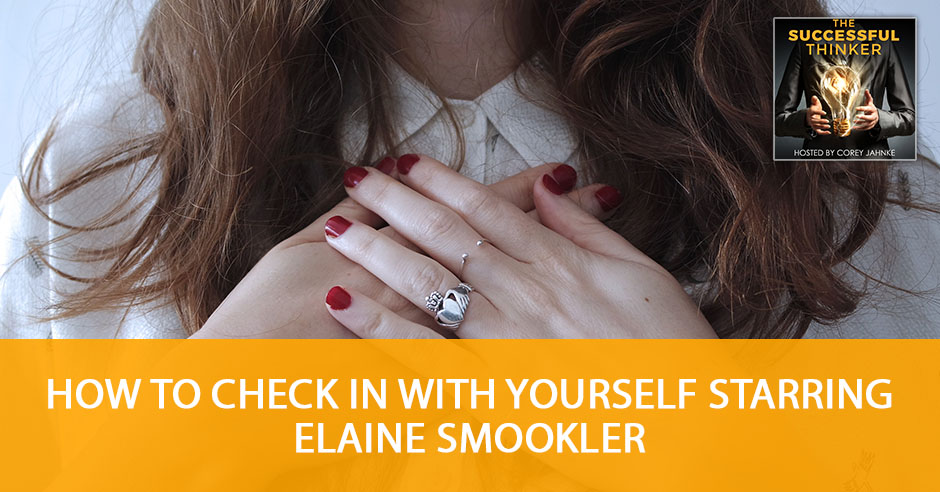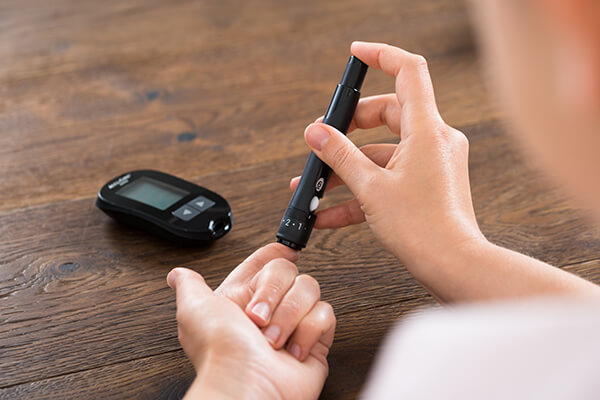
Elaine Smookler and Corey Jahnke offer a light-hearted and fun conversation on a very serious topic – deliberate self-care, which is putting yourself first so that you can be the best version of yourself for others. Elaine Smookler is a registered psychotherapist and entertainer who uses a fresh and inspiring approach for helping people use mindfulness and proper perspective to develop their storm kit so that they can maintain focus and energy when life’s inevitable struggles show up unexpectedly. Her biggest advice is to expect the unexpected!
—
Listen to the podcast here:
How To Check In With Yourself starring Elaine Smookler
Why Practicing Deliberate Self-Care Is Key To Successful Thinking
I have got a treat for you. I want to tell you a little story about a lady that’s going to knock your socks off. I am a subscriber to Mindful Magazine. I was reading a tremendous article about a person who has to call customer service. It’s the fifth time that she’s trying to get someone to help her with her problem and she is being transferred and she starts talking about the emotions involved in this process. As a pharmacist, I’ve been on both sides of the counter. I have to call other pharmacies a lot for my business and I get called and by the time sometimes that I get the call, another person is completely exasperated. This person whose name is Elaine Smookler is not only a mindfulness expert, but she’s also a psychotherapist. The way I took this article is she’s psychoanalyzing herself while she’s waiting for her turn to talk to the person. Let me welcome Elaine and see if we can talk a little more about that article. Elaine, welcome to the show. How are you?
I’m excited to be here, Corey. Thank you so much. It’s been so delightful for me that you found my article and reached out to connect with me and increase this wonderful web of connections.
Elaine and I want to help equip Successful Thinkers to handle this business of that emotional tug of war that goes on in a lot of areas. Am I a giver? Am I a taker? Do I take care of other people? Do I take care of myself? Elaine, when you were putting together this article, this was based on a real experience. Can you talk a little bit about that internal conversation with yourself and where you decided to go with it?
I write a regular column for the Mindful Magazine, it’s called Inner Wisdom. I regularly am looking for the ordinary things of life that I find I stumble over because my intention is to be a genuine person and to live in the heart and in connection with other people. However, the way the old nervous system works and the way the stress response work sometimes that gets pulled out of our hands without even knowing it, the old fight-flight-freeze mechanism. It starts to kick in and before we even know it, no matter how kind we intend to approach something, suddenly snarkiness is there because I didn’t realize before I even started, “I’ve had too many cups of coffee. I had an argument with my partner. I looked at my Visa bill,” whatever it is. As I started to notice that more and more of my interactions were happening with so-called anonymous people in that I wasn’t looking into their eyes which are often a moderator of emotional regulation.
When we’re looking into each other’s eyes, we’re generally a little bit kinder. When we’re in cars or when you’re on a telephone situation, I often find that the worst of us comes out. I started to notice that the worst of me was coming out and I was able to stand back and notice my heartbeat starting to get faster. I could feel my temper going up. I looked at myself and I said, “Is that how I want to show up in my life?” What was powerful for me is nobody was going to know this. It’s not that I’m living on camera. I’m not in a TV show where people are going, “Did you see that clip of Elaine where she was snarky to the person from the telephone?” When you’re looking at what I feel you refer to in the notion of a successful thinker, we’re not only looking at how we show up externally when everyone is looking. We’re looking at the components of kindness and heart and presence and connection that are built on the inside from values, from alignment with ourselves, from knowing what our intentions are as human beings. Recognizing what it feels like when we move away from that alignment so that we can consciously.

Self-Care: We’re not alone. We’re all in the struggle together.
If we wish to choose to come back because we want to be the beautiful human beings we can be. I find it helpful for me to live my life backwards from my deathbed so I can look at these things and say to myself, “Will I be happy that I had this rude conversation with this person?” By the same token, when I started to chew on that and asked myself these questions. I love that you’ve said, “Be my own psychotherapist,” because truly it’s exactly how I feel watching myself. What I noticed is I had within me a superpower and I started to explore this superpower. It’s the superpower called kindness. Almost as a scientist, I started to overtly be extra gentle, appreciative and kind to every person I encountered particularly in these interactions. I felt like that was watering flowers that I could feel blossoming right there in the conversation.
There was such joy in my heart as I felt this awakening of this human connection between me and we were no longer two strangers in conflict because I couldn’t get them to help me figure out how to get my internet service working. We were two human beings with a sense of humor and the scratching of the head and difficulty in our lives, laughing and understanding. I felt after these encounters instead of feeling irate, angry, hating the world, wondering why people are horrible. I came away from every one of these encounters noticing, “I feel good. My heartbeat is not up. My shoulders aren’t up. My back’s not up. I’m smiling. This person thanked me. They told me I made their day. That feels good. I made someone’s day. Isn’t that a superpower?”
That is the key to influence and leadership. What you’re noticing is what’s going on within you and then you’re saying, “If it applies to me, it probably applies to that other person.” One of the things that were interesting was that we are in an age where we aren’t looking in a lot of people’s eyes when we’re speaking to them. One of the challenges that I face at work is I work with someone who doesn’t like it when I leave the pharmacy to go talk to someone in another department because he feels that that’s inefficient. However, when I go to that other department, my first thought is, “Let’s see what this person is involved with first.”
It’s easy to pick up the phone. Elaine grabs the phone and I say, “Elaine, I’ve got a problem. Drop what you’re doing, deal with my issue,” versus if I walk over there and I smile and say she’s not in the middle of something and I’m watching her respirations and the look in her eyes, it’s an entirely different impact. I appreciate the way you laid that out because what we do when we are mindful is we are treating the other person as a co-conspirator in our solution. That’s what most people want is to feel valued.
You said a wonderful word that has a few meanings. You said co-conspirator. When I think of conspiring, I think about breathing together. Part of what we’re doing and this is not a fanciful Hallmark card idea. This is also the way the body and the rhythms of the body and tribalism, how we’ve been as humans and adapting. When we can breathe with one another which is what I feel you’re doing when you’re saying go to the other departments and you take a moment to breathe with that other person before you lay your trip on them. You are already moving into communication that allows for a softening and an opening.
The most important thing you can do when approaching another person is to ask yourself, 'How am I feeling right now? Am I hungry? Frustrated? Have I drank enough water today?' etc. Make sure you are in a good space before you interact. Share on XNotice for yourself the difference between somebody approaching you and says, “I need this.” Do you feel like, “No problem, I’d love to give that to you?” Probably what you feel is your fight-freeze coming in and you can’t even help that part of you that resistance is saying, “No, I don’t want to give that to you.” It’s natural. It comes up. It’s like, “I feel you’re aggressing me.” No, I’m protecting myself. When we breathe together and recognize we’re not alone. Thank goodness we know we’re not alone because that is rotten when we realize that. That’s one of those horrible stories. We’re not alone. We realize we’re all in the struggle together. We can smile together. We can laugh together and then at least I find in my life people want to do things for me everywhere. Everybody seems to want to help me because I want to help everybody. It’s because we’re conspiring, we’re breathing together, and creating an organic community of caring and sharing and that is for real. That’s not some leadership technique. That’s happening boots on the ground. If you don’t believe me, go and check it out for yourself.
One of the things is that people want to help you. I struggled in putting the show together and some other of my projects because for a long time it seemed like everything was going well for me. It should be obvious to everyone that treating people kindly and sharing that co-conspiracy should be obvious. I felt like I had nothing to teach. It’s obvious. There’s no way you don’t know this. One night, I was sitting at the Olive Garden. I was having the most wonderful time and I had this wonderful waitress. We just have this great dinner and the table next to me was having a terrible time. Their waitress, as far as they’re concerned, is horrible. All of a sudden it dawned on me that we have the same waitress. It also dawned on me that we didn’t have the same waitress because we have two different versions of the same person. How do you feel about versions of people and the energy that we transmit to others?
Any of us who look inside ourselves can see that we all have many different us. There’s the neighbor, there’s the parent, there’s the spouse, there’s the friend, there’s the person in the store who’s demanding their rights. There’s the person in the grocery store who is like, “I wanted that coupon and you didn’t give it to me.” There’s the person voting who is certain like, “What is going on?” There are many different ones of us that are showing up. It’s helpful and I’m going to share this scary little bit of information with everybody. I’m also a trained clown. I’m not a birthday party clown. I’m a theatrical clown. What that means in the work that I do because I use it in a therapeutic context is that we all wear different masks. The clown is a wonderful way to embody the various masks that we wear in life. When we can notice life is never only one way. It’s an interaction and also knowing that my view of things is hugely affecting my life.
For instance, here’s a question I have for you and I can see that you’re a kind person. Let’s say you were on your way to work and somebody cut you off on the way in your drive. Maybe it was serious and your heart was pounding and you started to feel it. People are rude. You want to believe in people, but you had the super intense experience and you’re on to get to work at that moment. You’re still filled with adrenaline and cortisol and you’re flushed. You’re standing in the pharmacy and somebody cuts into the lineup. There are a lot of people wanting in and somebody got an entitled thing. You can see it and they cut in then they come to the front. Maybe if you’re in your best state and you’re calm and you feel good, you would know how to handle that person and you would feel completely be fine with them. You’re starting to spot a place of the relative balance of wellness.
If your starting spot is a place of unrest, distress, you haven’t even noted to yourself how maybe freaked out or how traumatized you even feel from this event. Maybe the interaction you have with this customer suddenly is ugly and is not good and does not go well and you engage with each other in an unpleasant way. It’s not that there’s a different Corey. Somebody might say, “That man is rude behind the counter,” because they don’t realize what’s going on with you. They don’t accept you’re a human being. We think, “You’re supposed to show up as a robot every single time and be Westworld.”

Self-Care: When we can’t care for ourselves, our blood sugar goes down. We have a negative physiological response that’s beyond our control.
It’s important not only that we can allow that other person may have things going on that we’re not aware of. Maybe somebody in their family has cancer. Maybe they fought with their spouse. Maybe they’ve been cut off on the highway and had a scary situation. Who knows? Maybe themselves. Maybe you haven’t checked in with yourself yet to know what my starting spot is now. I don’t know if you’ve ever heard of a HALT practice. It’s not even a mindfulness thing, but it’s one that I teach a lot. I love it because it stands for Hungry, Angry, Lonely, Tired.
Where can we start and notice, “What’s my starting spot before I even have this encounter? Have I eaten now? Have I already had an unpleasant, upsetting encounter? Maybe I’m already riled up just reading the newspaper. Do I feel all alone?” Maybe you talked about the person you worked with. Maybe I feel misunderstood at work. Maybe I don’t feel I have support. Maybe I’ve doggone tired. These things are important for us to be able to notice that they’re part of our starting spot so that we can employ kindness and compassion to ourselves.
Something that we’ve been talking about is how often people who are kind and helpful to others do not offer this to themselves as though that’s fine. That’s okay, you have the last piece. I don’t need to sleep. I don’t need to drink. I don’t need to drink water. I don’t need to have a pee. I don’t need anything. I’m not even human, but then what happens? When we can’t care for ourselves, our blood sugar goes down. We have a negative physiological response that’s beyond our control. Our mood goes low. We can’t control it. It’s physiological. When we have a strong emotion like anger that’s already there that we haven’t been attentive to. It may have built to a stress storm.
We’ve been living in a place where we feel cut off and alone even from our spouse. We’re working hard for everybody. We’re trying hard to give everything to everybody and yet it never feels enough. Why am I still disappointing everybody? I watched Marie Kondo’s show and I can’t tidy up enough. I’m tired that my body doesn’t have the nutrients it needs to be resilient. If we can’t place these recognitions in as part of the biological experience, there’s no way to be a successful thinker because we’re not allowing the possibility from starting from a place of wholesome well-being.
You solved one of the most interesting articles I’ve ever read, which is why willpower is extremely difficult in the evening. By the time you get to the evening, you are spent. You’ve been giving enough away during the day and haven’t replenished. Now you’ve got nothing left to fight with. What I think is interesting about the way you laid that out, as a pharmacist, one of the fascinating things that you are is a third-party observer. Let’s say the customer comes up to the window and she deals with one of your colleagues. I was a pharmacy manager for a long time and so then the customer will report to me that this person was rude and you watched it. You literally watched it. It’s interesting what rude means to different people. Sometimes it’s a cultural problem, sometimes it’s an interpersonal conversation, but a lot of people think rude means they didn’t give you what you wanted. It’s fascinating to watch how every interaction goes, but one that came to mind and I was interested in getting your perspective on this.
Have the courage to allow the possibility of letting go of your agenda to stay close to your inner self. Share on XOne day I got a call from the store manager. I worked in a big department store so the pharmacy is in the middle of the store. There’s a guy who was in charge of the whole store and he said, “I’ve got this customer irate because your employees wouldn’t wait on her while she was talking on her cell phone.” That’s an issue in America at least. We’ve got a lot of people wanting to do their regular business whether it is at the Subway restaurant, the grocery store and the pharmacy, whatever they want to continue on their conversation while they’re doing their business and the employees don’t want to wait on them. What I did is I said, “Let me come back to your office and let’s talk about this,” because I was fascinated as to why my employees didn’t want to wait on this person. How do you think that speaks about my employees? Why would they not want to wait on this person? It was fascinating to me.
This speaks to this little unfortunate problem of being human. It’s awkward that we’re humans and not robots. Eventually, I’m sure we’ll all be robots, but right now, we’re still human beings and we feel it’s meaningful to interact with one another. First of all, we live in an underslept world. It’s not always evident because makeup and the gym gave us the illusion of being buffed up, prettied up and botoxed up so on the surface, we don’t necessarily buy-in. We can show up looking okay, but what’s going on behind the eyes and in mind and in the nervous system is not necessarily how it looks on that patina, on the outside. You’re dealing with people who are also human behind the counter and who are not robots. Who may feel, “Excuse me, how disrespectful of you to not recognize that I’m also a person? Please don’t treat me like I’m an automaton,” and then we move in. I feel the word that keeps circling my head is happiness.
What does success mean? I have the people in courses that I teach who are incredibly successful surgeons or whatever and I say, “Why did you come to this course?” They’re amazing and they have everything. They said, “When I wake up in the morning, I don’t feel the way I think I should.” We’re living in a society where people are feeling quite uncomfortable in their own skin and then they want to ignore it and pretend everything’s okay. Have regular interactions as if nothing’s changed when we’re losing our humanity tiny bit at a time. It is a challenge though. One of the other things I’d say though and this is something that I think about a lot is the reality of needing adaptation. Cell phones aren’t going away. I can’t force people to give me their attention. Sometimes that comes back to me to breathing together.
Another way that I might handle the situation that you described if I were curious about interaction with another person is I would wait. Let’s say I’m the person behind the counter and you come to me with your cell phone. If I could know and I almost treat it as a game for fun, keeping it light and say, “I’m going to breathe. I’m going to watch my face. I’m going to stay with you. I’m going to stay calm. I’m going to wait for you to look up. I’m not going to do anything until you do. I’m not going to fight with you.” You’re going to say, “Sure,” but I’m going to go slow and stay connected to that person. That to me is a way to have people breathe with you.
At first, that other person might look at you like, “What is going on here?” because you interrupted their automatic pilot. In a way, we’re looking for friendly ways to interrupt automatic pilot so that we can help each other connect with our humanity and thinking of it as a kindness to me and kindness to you. When I can remember we’re all in this together. You’ve annoyed me as a person on the other side of the counter by treating me rudely but I don’t know what’s going on in your life either. What happens if I breathe with you? Try to stay calm and also stay in alignment with myself that I don’t rely on you to give me a feeling that I’m respected.

Self-Care: Not everyone is going to get what they want from you, and that’s called a boundary.
A couple of the things The Successful Thinker book talks about are the law of the story and the law of the agenda. The law of the story basically says that you’re operating under this story that you’re telling yourself. Sometimes when the moment seems bad, you have to change the story. The law of the agenda says sometimes it doesn’t go the way you want it to go, but if you flow with the universe’s agenda, it turns out better. I was thinking about one of the stories in The Successful Thinker that happened is I had this gentleman and he was an enormous gentleman. He stormed up to my window and he was furious. I saw that and I ran right over to the window and stepped in front of my technician because I didn’t know what was going on. His first question was, “Are you a racist like that guy across the street?” That’s how we started. I said, “Describe that guy you are talking about,” because I knew all the pharmacists in town and everything and he tells me. The guys I saw, that guy is a jerk to everybody. We started there, “What’s going on?”
The long and the short of it was he had a prescription. He had tremendous back pain and the doctor forgot to sign the prescription. The prescription is not valid. All it takes is a phone call, but what I notice is sometimes when we try to explain a situation to a patient in pain or a patient in emotional distress, they do not hear that. All they hear is there is a problem. A lot of times what I always say is that there are two problems. The problem and the fear we’re not going to be able to solve the problem. When you are saying to me this business about human, one of the things as healthcare professionals that we can agree on is that everybody’s got a circus going on. The details are the only difference.
I see people’s prescription profiles and their friends, neighbors, relatives would sometimes be surprised to know that this person, which I would never tell them. They would be surprised to know that this person is struggling with a given condition. A lot of times they’ll confide in me how scared they are, but because they’ve always been the rock for their family, they don’t want to tell you that. They don’t want to tell their friends and family because they want to maintain the rock still. I was wondering, in your profession, do you find people struggling between trying to be tough outwardly when they’re struggling inwardly?
When you look at the notion of successful thinker, I would imagine that any of you lovely people who are reading are super energetic people working hard to promote the goodness and the ideas and the ideals that you’ve been working with. To a certain degree, there are many billions of people in the world and so much competition. It requires a certain kind of so-called toughness to be able to cut through that. Many people operate their lives with a veneer because we are afraid of being judged. Sometimes when we can have the courage and it does take courage to allow the possibility of letting go of our agenda. Instead, stay close to our inner self so that we may notice the auspicious coincidences coming up. It allows us to be soft and in touch with ourselves instead of feeling we have to put forward a hard, tough front.
My personal brand has been about being an outrageous person who shows up as myself everywhere. I come from a background of comedy and performance before I went to psychotherapy and ended up teaching at the University of Toronto Medical School. I thought, “How on earth did that trajectory happen?” Part of it was not because I was tough. How did the clown end up at medical school? Not because I was tough and showed up in a tough and impressive way, but because I stayed close to my inner self. I want to come back to something you said about prescriptions and how people don’t always get what they want. One of the other tough things for people in business or any human is the reality if you want to live in alignment with yourself and what I would call a successful thinker. Sometimes it’s absolutely going to include not giving people what they want. That’s a reality. Not everyone is going to get what they want from you and that’s called a boundary.
If you give somebody your attention right away, everything calms right down. Share on XYou referred to me as a psychotherapist. A boundary is an important piece for children and adults and some people are childish and they need a boundary. Let’s look at that situation you said with that gentleman that came up to you. My understanding is there’s a giant opioid crisis going on in America and all over the world. Somebody might come to you and say, “I’m in so much pain. Are you racist?” They may have an amazing story that makes you feel flustered like, “I’m so sorry, that sounds terrible.” Before you know it, you’ve given in and been wrapped up in someone’s external storm, emotional story, sounds real.
The reality of your profession is you have a boundary that does not allow you to cross over it regardless of the reasons why somebody tells you they need something. We can look at this as a parent and say, “Your child might say to you, but everybody else in my class is going on that stage ramp.” It doesn’t matter. We need to be able to know. If we’re truly going to be successful thinkers, what does success mean? Part of it is being able to maintain my own integrity in the face of difficulty. Can I be soft and open? You asked me about showing up as tough and do I see people showing up as tough. Can I be soft and open and firm at the same time? That for me is what successful thinker is about. You have to be able to have a strong back and an open front.
I love that because that was essentially the challenge that we were trying to solve when we wrote The Successful Thinker was how do I get other people to do the things I need them to do? The realities aren’t changing without having to be a jerk or without having to compromise who I am. You laid that out beautifully. It’s firm, being strong without necessarily compromising that.
The first piece is always listening and even coming back to what you said about anything. We can stop and listen to the other person and show them and really listen. Who here hasn’t had the experience where somebody is smiling and nodding but they’re not listening? We’re talking about genuinely giving somebody our attention which is a palpable experience. People know when you’re listening to them. There’s something amazingly softening, connective, spacious when we can give each other our attention and still say no. My starting spot tells me what the problem is. It doesn’t matter even if you’re not telling me the truth, I’m going to be completely open and listen to you. You may not get the answer from me that you think you want, but often and it’s like a little kid.
Have you ever had a little kid come up to you and say, “Mommy, daddy?” What are kids usually looking for when they’re doing that? Attention. I think many of our relationship conflict at work and interpersonally, even when people are not “given what they think they want,” are soothed by genuine listening and attention. You’ll notice if you give somebody your attention, a child, right away everything calms right down. That’s my experience. Calms right down and if it doesn’t, look at yourself and say, “Am I really giving them my attention?”

Self-Care: When our minds feel speedy and we feel overwhelmed because we’re trying to handle too much, we need to shift our attention back into the body.
I wonder if the whole world wouldn’t be served by envisioning other person wearing a sign around their neck that says, “Make me feel important.” One of the things I wanted to say myself personally is I love being 52-and-a-half years old because I’m old enough to have experienced the day when I realized I didn’t have to know everything. We were talking about self-care and how important essentially self-care is. Sometimes when people think about self-care, we think about, “What do I eat and the exercise?” We’ve broached this part of this topic about the way we talk to ourselves and the way we talk to other people is a part of self-care. Do you agree with that? How do you think a person should go ahead and prepare themselves for these unavoidable conflicts and things?
One of the things that are relevant and pertinent to what you said is the word unavoidable. Even if you are the most successful person in the world, this is what I was alluding to. Part of the human experiences that we are going to have, what your lovely wife Tonya called. She called them ugly times. I feel that when we can open up space if you consider putting everything in a much wider circle and acknowledging that whether I like it or not. Ugly times, i.e., anything I don’t want. It doesn’t mean I don’t want that. That’s all we mean by an ugly time. I don’t want that feeling. I don’t want that experience. I don’t want that whatever. That’s not what I want.
I was listening to Gary Campbell‘s amazing podcast with you and he laid out what the team had boiled down to the successful thinker, respect and they had all these lists of wonderful things. I thought that’s all fantastic, but what happens on that day when you wake up and you still feel crappy even though you’re doing everything right. You’re a giver and you’re a servant’s heart and everything is perfect, but because for whatever reason. Hormonal, biological, the weather, maybe somebody in your family is not well, all the reasons we’re going to have those ugly times.
Knowing what’s coming is important because then we can smile and say, “It’s not wrong. It’s not a problem. It’s not that I’ve done something wrong or I’m being punished. This is a natural part of life.” Number one is recognition. This is okay. I can allow for this. I talk to you about the notion just for fun of considering a storm kit. If you live in a storm territory, you don’t say to yourself, “I don’t believe in hurricanes. I don’t need to prepare. I live in Florida, but I don’t put up shutters on my windows because I don’t believe in weather. I’m going to smile my way through it.” We wouldn’t do that. We would say that’s not wisdom. Wisdom is you prepare. What would preparation look like? I’ve come from a wonderful symposium on wellness from a Hospital for Sick Children in Toronto where they boiled down neuroscience and how the brain works and how wellness works to three things. It has to do with knowing where our mind is. Knowing, “My starting spot is I’m already in an upset mood or I’m in a joyful mood or knowing where my mind is, engaging.” In other words, noticing that if I’m exhausted, I’m not engaging with things and I’m flatly looking at everything. I’m not connected to my life.
We need to know where our minds are, be honest about where we’re at. Not a Pollyanna, “I’m great,” that’s not helpful. We need to know for ourselves, “My mood is low. I’m not feeling good. I feel unhappy.” Care for ourselves or know where our minds are, engage, and be able to shift our attention away from what we call rumination. Rumination is that hamster in the mind that says, “I can’t believe you did that. I can’t believe she said that. I can’t believe that person is coming out. That’s not right. Do you know why that happens? I wonder if he’s going to call? I wonder if she’s going to call.” Those things are like worms in our mind. They are the things that are often the predominant cause of mental health problems. We call that the ability to decenter, to place our attention elsewhere. That’s the underpinning of the storm kit that I’m going to suggest.
We're still human beings and we feel it's meaningful to interact with one another. Share on XOne of the ways that we can create this storm kit is by checking in with that HALT practice. Asking myself when I’m starting to feel my mood slipping when I’m starting to feel I’m about to push somebody down a set of stairs or whatever it is. I can check in with myself and say, “When was the last time I ate? Do I need to go for a little walk? Do I need some water? Do I need some care?” On a biological level, we can know where our minds are. We can check in with that HALT practice, “Am I tired?” Maybe it’s not realistic for me to expect more from myself. I’m exhausted. My body as a biological form is exhausted. One of the things we can do to engage is a little practice called CALM practice.
Sometimes when our minds feel speedy and we feel overwhelmed because we’re trying to handle too much, part of what we need to do is shift our attention back into the body. Many of us don’t even feel we have bodies. We forget we have them. We feel disconnected from ourselves. Let’s take a moment together. If you’re willing, I’ll take you through this little CALM practice. It may take a few times because we’re looking at opening up new neural networks of the brain. If this feels like it’s hard to connect with, please be kind to yourself and say, “That makes sense. I’ve never done this before.” It’s like saying, “I went to the gym and tried to lift the 500-pound weight and I couldn’t do it.” Let’s give it a try. On an in breath, I invite you to let yourself shift your attention from your busy mind for a moment to feel your breath entering your body. I say feel it because we’re not thinking about the breath. We’re shifting our attention to a felt sense that’s happening in the so-called present moment like breathing. Breathing in and feeling it.
On an out breath, you could be kind and let your shoulders drop down. Doesn’t that feel nice? Bring some kind attention to noticing where your lovely body is sitting, touching the chair, you feel that. Maybe you can’t feel much, that’s okay. Whatever you can feel is fine, but the important thing is kind attention. You’re not going, “My belly. My hips.” You’re saying, “Hi body, thank you for being such an excellent vehicle for me. I appreciate you.” Bringing your attention to your dear feet as they touch the ground if they are. Sending some appreciation, “Thank you, feet.” The CALM practice stands for Chest, Arms, Legs and Mind. That’s what we’re going to engage with.
On the next in breath, I invite you to shift your intention to ordinary, noticing any sensations you might feel in your chest or your chestal area. When you breathe in, do you feel a tight band around your chest? Can you hear your heart beating, feel it? Do you feel any tingling or pulsing or maybe feel numb or neutral. It’s okay, whatever you feel is fine. You’re tuning in to any sensations you feel in your chestal area and on an out breath letting go of noticing sensations in the chest and on an in breath shifting to the A of the CALM practice, arms. You’re just tuning in and noticing, “I have fingers, hands, and arms and feeling them.” Check in with your fingertips, knuckles and joints of the fingers. Are they pulsing or throbbing, tingling, numb and neutral? Maybe you notice the cool or warm air, back of the hand and the palms, breathing and feeling what’s here. When you notice thoughts coming in, see if you can come back to the body, wrists, arms, elbows, shoulders and an out breath let go of noticing fingers, hands and arms. On an in breath, the L of the CALM practice is the legs, we’re engaging with sensations in the body like feet and legs. What do you feel?
If you feel nothing, that’s okay. Just notice that without alarm. Ankles and ankle joints, lower legs and knees and thighs. If in your car, maybe noticing your legs touching your thighs touching the seat, but I hope your eyes are open. On an out breath, letting go of noticing the legs or what you’re able to notice. On an in breath, outrageous. The M, moving to the mind. What do you notice in your mind’s state? Is it busy or sluggish or sleepy? Angry or joyful? Noticing your starting spot. You’re not even trying to change it. You’re letting yourself notice how things are now with kindness. On an out breath, releasing this attention on noticing how things are in your own little head, opening your eyes and raising your gaze. What did you notice, Corey?

Self-Care: Communication is part of the storm kit. We have to communicate with ourselves.
It is interesting because you get used to feeling these things that you don’t recognize that you’re even feeling them. You do notice that there’s tightness in places. When I was younger and before I even heard of mindfulness, I would a lot of times determine these things are anxiety and stress and things. Taking a few minutes to check in with those body parts tells a person, “Now might be an excellent time to walk around, to stretch that body out and things like that.” One of the things that came to my mind when you were laying this out is how many times I’ve heard in my practice, “I never thought this happened to people like me.” Maybe they’ve got a diagnosis. Maybe they’ve got a problem. I always thought that this happens to someone else. It’s important that everyone realize this is vital to each of us because it only happens to other people.
We’re all human. My father had a stroke and I went to visit years ago in the hospital. The person in the bed next to him was an eighteen-year-old who also had a stroke and this kid was it. He was young and fit. It was the luck of the draw. None of us knows what life has to offer, but I feel that the good news and my personal news is we can work with our lives exactly as they are. If what you find is that you’re in a situation that you’ve got twelve children and four husbands and fourteen households and thirteen jobs or whatever.
That may sound super stressful, but what I would say is there’s only one moment at a time that we can truly deal with. The old science gave us the notion that we could multitask our way to happiness, but single tasking has been proven to be a much more efficient way to be productive but also it leaves us feeling less stressed out and happier. That’s why this CALM practice, even if people felt, “That was difficult. I couldn’t do it or I didn’t feel anything or this isn’t for me.” It’s important to know that it’s a training of learning to reconnect with ourselves so that we can understand how I might care for myself?
Maybe I didn’t even notice I was hungry. When I asked people to notice their mind state, usually people say, “What? I have a mind? I don’t know,” but eventually if you continue to be open and curious, you will start to notice. I noticed in my relationship that I can feel when I start to get irritated. I’m now able to say to my husband, “I’ve got a deadline and I’m stressed out. I can hear in my language that I’m a bit uptight. Please don’t take it personally. It’s where I’m at right now.” When I’m able to say it out loud, it brings so much ease to our relationship. Instead of him entangling with me, “Why are you talking to me like that?” He knows, “My lovely wife needs some care right now. She’s articulated to me she’s struggling.”
Communication is part of the storm kit. We have to communicate with ourselves. That’s CALM practice. How am I doing right now? We have to communicate with each other. What do I need? If I don’t tell you what I need, then I might be resentful that you’re not doing a good job of reading my mind like, “I don’t know? What’s going on with you if you don’t tell me?” We want to be able to find a way to tell people what we need without necessarily expecting them to jump to it and give it to us. Where we can say, “I’m on a deadline and I need some space. I’m not going to be able to cook dinner. Can we order in?” It’s great because it’s money for the family. We need to find ways to care for ourselves otherwise we’re going to use ourselves up and there won’t be anything left to offer anyone.
With your permission, I’d like to call this part one.
We didn’t get to so many things.
I know that you have a lot of tools and things to help people do this on the fly, to take care of themselves in stressful situations and things. I want to appreciate you for sharing so much with us. I’m hoping that the Successful Thinkers out there take this one thing away in that I need to ask myself, “Am I taking the best care of myself so that I can take care of others and so that I can take care of my thinking and check in?” Is there anything that you’d like to add to the readers to take away or anything that’s on your heart that you want to share before we leave?
I would like to say how much I truly, deeply appreciate you and what you’re doing because we humans one at a time can offer ourselves love, kindness, and care. Offer it to each other and transform the world one person at a time. I do want to say that many of us feel shame and embarrassment as your wife, Tonya, talked about in her podcast when we feel that we’re not showing up the way we want to. When we can do what the airplane tells us to do, which is put the oxygen mask on ourselves first before we go to put the oxygen mask on others. We can then offer ourselves kindness and care and model successful thinking not just by telling people what to do, but by showing up, living joyfully, being in balance in our lives. Having our eye on the prize, which is not just money, success, and power, but happiness, connection, being in contact with our own hearts and living in alignment with our own values.
Successful Thinkers, we’ve given you permission to put yourself first every now and to check in and take good care of yourself. I hope that you do that. I hope that going forward, you will put into practice as many of the concepts that Elaine shared as possible. I hope you truly take some time to enjoy yourself. I want you to know that no matter what happens, I believe in you. Take care.
Important Links:
- Elaine Smookler
- Mindful Magazine
- The Successful Thinker
- Gary Campbell – Past episode
- http://www.ElaineSmookler.com/
- http://www.EMindful.com/
- Mindful.org
- https://Twitter.com/ElaineSmookler7
About Elaine Smookler

Elaine Smookler is a Registered Psychotherapist (RP), teacher, writer and performer (ACTRA, B.Music) based in Toronto, Canada. Elaine is on faculty at the Centre for Mindfulness Studies where she teaches many programs including Mindfulness for Beginners and clinical programs such as MBCT. She is a facilitator of The Mindfulness Project at the Hospital for Sick Children and offers mindfulness therapies online through eMindful.
Elaine has been certified as a Mindfulness-Based Cognitive Therapy (MBCT) Facilitator by the Factor-Inwentash Faculty of Social Work at the University of Toronto. She works privately, with groups, and in corporate settings.
Love the show? Subscribe, rate, review, and share!
Join the Successful Thinker Community today:

